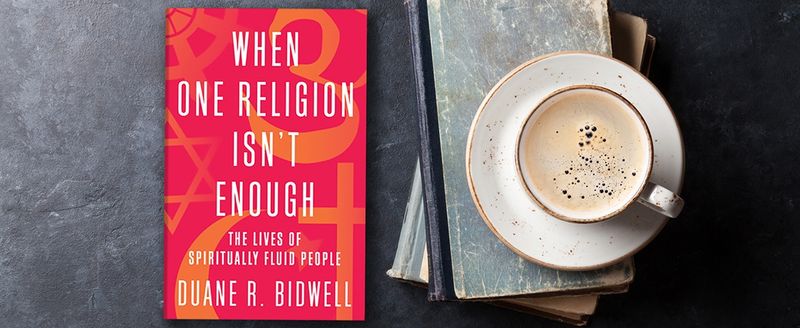It’s fitting that a book about the phenomenon of “spiritual fluidity” or “religious multiplicity” should aspire to be several things at once. Duane R. Bidwell’s When One Religion Isn’t Enough: The Lives of Spiritually Fluid People aims to describe the experience of participating in more than one religion while also helping the spiritually fluid feel less alone, while also persuading the monoreligious to approve religious multiplicity. Readers who already practice syncretism or identify themselves as spiritually fluid will probably take some encouragement from his sympathetic perspective. The purely descriptive sections of the book are less successful, but still provide useful insights and raise interesting questions that deserve fuller treatment. The attempts at persuasion, however, distract more than they enlighten, and taken as a whole, the book is a muddle.
When One Religion Isn’t Enough argues for a non-propositional understanding of truth in order to justify deemphasizing doctrine—that is to say, he wants a kind of truth that’s not based on statements so that doctrine isn’t as important to a religious system of belief. However, his interviewees’ accounts of themselves are riddled with propositional truth claims—they articulate clear doctrines of spiritual reality, the role it plays in their lives, and the relationship between the various religions they practice. Bidwell himself makes a number of propositional truth claims as well—for instance, we should celebrate the spiritually fluid because Mystery (his name for the divine principle) is not offended by religious multiplicity. The foundation for this exhortation is the belief—the doctrine, proclaimed by Bidwell—that Mystery is and behaves in certain ways. Despite sincere efforts, he cannot escape the necessity of doctrine.
Bidwell and his fellow practitioners use the same kind of language to explain their religiosity. Over and over again instrumental, therapeutic concepts of religion’s role crop up in interviews, alongside the idea that all religions possess something like an incomplete picture of a larger spiritual reality. Most of the people he interviews, regardless of self-identification, express similar values and beliefs—for example, one interviewee describes her religiosity as “respect[ing] everything” and “tak[ing] tools to help me grow.” The spiritually fluid share a body of doctrine but differ in practice, affiliation, and sense of self. Calling them adherents of American popular religiosity might not square with their own self-conception, but it describes them as well as (if not better than) the term “spiritually fluid.”
Perhaps the most frustrating aspect of the book is how heavily its core argument leans on the assumption that the reader already more or less agrees with the author. Instead of making a robust positive case for the value and validity of religious multiplicity, Bidwell points out how “normative” frameworks for understanding multiplicity marginalize it as a less acceptable form of religiosity; that is, since traditional ways of understanding religion don’t ‘like’ the idea of mutually-exclusive religions being held as equally true, they tend to set aside the kind of syncretism Bidwell proposes. Bidwell assumes that the reader already shares many of his key claims—that doctrine is unimportant, that religion is fully valid if it merely fulfills therapeutic needs, that spiritually fluid people have something valuable to contribute.
Those key claims are, of course, the core values of a growing segment of the American populace. He argues persuasively that existing immigrant populations and shifting migration patterns will bring Americans into contact with more religious traditions and more people who practice these styles of syncretism. There is no reason to expect that the kind of moralistic therapeutic deism that underlies American religious multiplicity will decline, suggesting an ideological foundation for increasingly syncretic and eclectic religiosity. His description of how interfaith marriages and other forms of inherited religious multiplicity operate provides glimpses of another, much more valuable book that might have been. The breadth of experiences and the complex interplay of racial and ethnic heritage with belief shed light on an area where tension seems inevitable but often hard to explain. Understanding what motivates syncretism or religious multiplicity and delineating the inherent tensions involved in adjudicating competing religious, cultural, and familial claims provides valuable insight into the spiritual lives of our neighbors.
While Bidwell himself does not operate from a strong view of biblical authority or sufficiency, he does claim to be a kind of Christian (a Buddhist Christian, specifically), so it’s worth pausing to consider the topics he raises from the perspective of historic Christian doctrines. The category of spiritual fluidity is not foreign to Scripture at all—God’s word addresses the topic repeatedly, and it is neither ambiguous nor approving. In the Old Testament, the prophets describe Israelite practices of combining Yahweh-worship with the religions of the surrounding nations as idolatry, and compare it to the sin of adultery. In the New Testament, Jesus’ admonition against serving two masters seems to address the underlying principle of combining true religion with false. 1 Corinthians makes clear both the moral status of and the Christian response to spiritual fluidity. While idolaters will not inherit the kingdom, Paul goes on to point out that “such were some of you. But you were washed, you were sanctified, you were justified in the name of the Lord Jesus Christ and by the Spirit of our God.” (1 Cor. 6:9-11).
Religious multiplicity is not ratified by God, but it is addressed by Christ’s work for us—the spiritually fluid find their proper context in the same repentance and reliance on Christ that all believers experience. The Christian, therefore, has an existing framework for understanding spiritual fluidity. Bidwell’s contribution is a good encouragement to those who agree with his premises, addresses some interesting topics, and provides ample scope for dialogue, but adds little clarity to the discussion.
Leslie A. Wicke graduated with a degree in history from Patrick Henry College. She is a writer and artist whose work can be found at www.leslieawicke.com and www.tbjeremiah.com. She and her husband currently live in Virginia.



